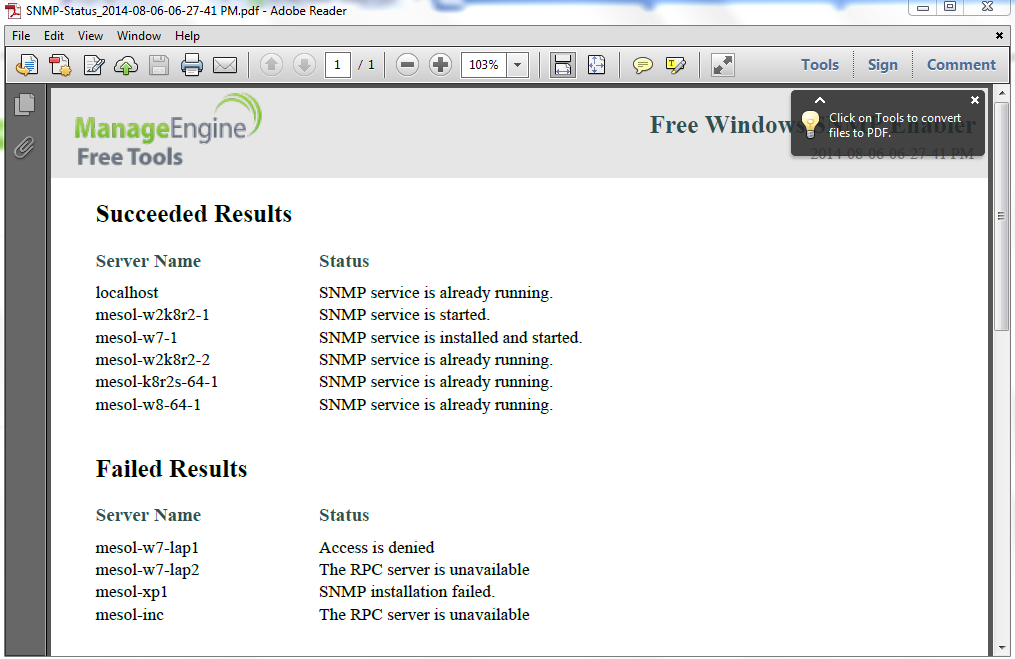How To Install Windows Snmp Service
[SNMP is available for use in the operating systems specified in the Requirements section. It may be altered or unavailable in subsequent versions. Instead, use Windows Remote Management, which is the Microsoft implementation of WS-Man.]
Purpose
The Microsoft Windows implementation of the Simple Network Management Protocol (SNMP) is used to configure remote devices, monitor network performance, audit network usage, and detect network faults or inappropriate access.
Important
Configure an SNMP Agent and Community String in Windows 2008 R2. Log into your dedicated server using Remote Desktop. Click on Start > Administrative Tools > Server Manager. Click on Features > Add Features. Verify SNMP Services are installed. Click on Configuration > Services. Right click on SNMP Service and. SNMP has been deprecated on Windows 10 1809. Please keep in mind, Windows 10 uses the same code as Windows Server, If you want to get more information about this, please check this link: Features Removed or Deprecated in Windows Server 2012.
The Microsoft Windows SNMP API only supports protocol versions up to SNMPv2C. It does not support any later versions of the protocol.
Where applicable
SNMP uses a distributed architecture consisting of management applications and agent applications. The SNMP service implements an SNMP agent. To use the information the SNMP service provides, you must have at least one host that is running an SNMP management application. You can use third-party SNMP management software, or you can develop your own SNMP management software application. The following APIs are available for this purpose:
- SNMP Management API, a set of functions that can be used to quickly develop basic SNMP management systems
- WinSNMP API, version 2.0, a set of functions for encoding, decoding, sending, and receiving SNMP messages
Additionally, the SNMP Extension Agent API defines the interface between the SNMP service and third-party SNMP extension agent DLLs. The SNMP Utility API functions can be used to simplify the processing of SNMP messages.
Developer audience
The APIs listed in the preceding section are designed for use by C/C++ programmers. Familiarity with SNMP and SNMPv2C, as well as a working knowledge of networking and network management concepts, are required.
C# Uninstall Service
Run-time requirements
For more information about the operating system required to use a particular function, see the Requirements section of the reference page for that function.
In this section
| Topic | Description |
|---|---|
| New in SNMP | Information on updates to SNMP. |
| Simple Network Management Protocol (SNMP) | Information and API reference for SNMP, including the SNMP Management API, SNMP Extension Agent API, and SNMP Utility API functions. |
| WinSNMP API | Information and API reference for the Microsoft Windows SNMP Application Programming Interface (WinSNMP API). |

Related topics

Adding the SMTP service to a Windows OS seems quite straightforward in almost all cases: open the Windows Features interface, then check the 'Simple Network Management Protocol' option. After rebooting, a new local service should be available called 'SNMP Service'.
I've followed those steps in Windows 10 Pro 64-bit, but I find that there is no 'SNMP Service' to be found. There is an 'SNMP Trap' service, but that's apparently not what I'm looking for. It seems the SNMP agent settings (eg. community name) can only be modified within the properties of 'SNMP Service'.
In my searching, I found a Powershell command purported to install the SNMP service:
However, the result is an error message (even when run as Administrator):
The words 'client-based operating system' suggests the SNMP service is only available for Windows Server OSes, but that wasn't true for Windows 7/8. So I'm curious whether this has changed with Windows 10.
3 Answers
You're actually addressing 2 problems in your question:
- You can't use Windows Server native PowerShell commands, they simply unavailable for any other than Windows Server architecture.Run
gcm -module DISMto get a list of supported commands for your machine. - SNMP service does exist in Windows 10: SNMP in Windows 10
If you don't see SNMP Service in the list of available services, but only SNMP Trap, then you need to add the service, which you can do by the following steps:
- Right-click on the Windows Start button and choose Control Panel.
- Select Programs from within the Control Panel, then, under Programs and Features, select Turn Windows features on or off.
- Find Simple Network Management Protocol (SNMP) in the list of features and check the check box next to it then click on OK.
Once you've installed support for the service, the process for configuring the service is the same process as for configuring SNMP on Windows 7 systems.
moonpointmoonpointWindows 10 Build 1809 Does have a bug in it that does not show the SNMP Services, This is the FIX for this issue :
- Open Powershell with Administrator credentials
- issue the following commands
- Get-WindowsCapability -Online -Name 'SNMP*' --> Will show Not Present
- Add-WindowsCapability -Online -Name 'SNMP.Client~~~~0.0.1.0'
- Get-WindowsCapability -Online -Name 'SNMP*'
- Get-WindowsCapability -Online -Name 'SNMP*' --> Will show Installed

The feature still does not show in the turn windows features on or off window however the service is installed and you can view and configure from services.msc I have verified that the service works as expected.